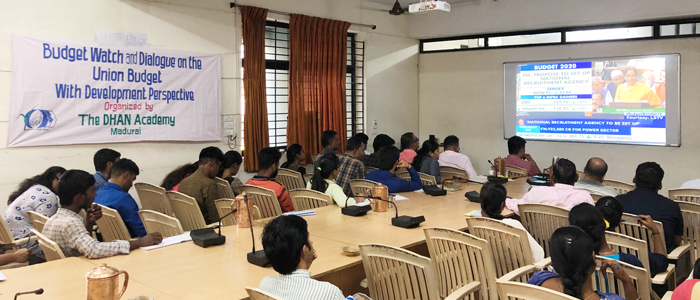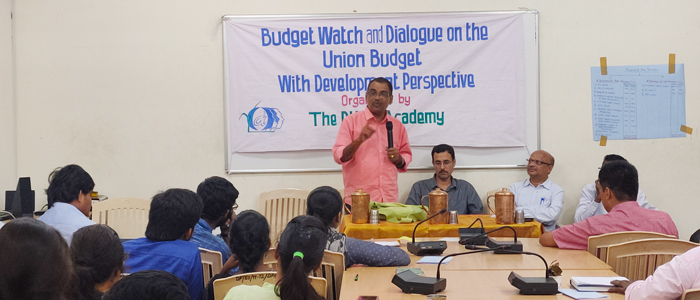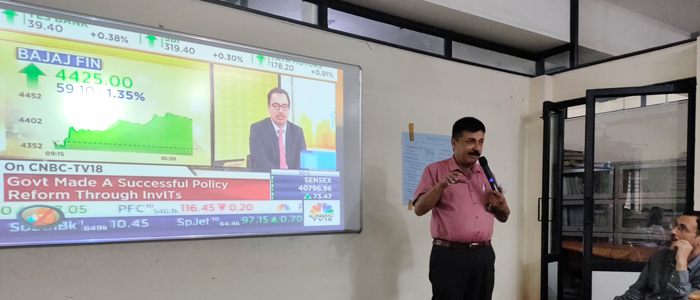The DHAN Academy annually conducts “Budget Watch and Dialogue on the Union Budget with Development Perspective”, more than 100 students from different colleges across Madurai have participated. The event was started by academy students presenting the previous year budgets and expectations from different sectors. The experts from different fields have also participated.

On February 01, 2020, following the tradition set in 2018, the Finance Minister for Government of India presented the Budget for India for the year 2020 – 21. Lasting nearly three hours, the budget speech by Shrimati Nirmala Sitharaman, the second lady Indian Finance Minister after Indira Gandhi, elaborated on her Government’s outlook for the country. The budget speech was significant on many aspects. First, it was the longest budget speech ever made in free India. Second, it was the first full budget of a majority Government formed by BJP (Bhartiya Janata Party) for the second successive time in India. Third, the Budget speech was not completely narrated by the Finance Minister, and she, on account of health reasons, stopped midway, without seeing through to the end of her speech.
The Finance Minister must have been under tremendous pressure to have delivered a long speech, notwithstanding the many parts of the speech, she repeated multiple times, to emphasise the thrust of the speech. An Alumnus of Jawaharlal Nehru University, Delhi, Ms. Sitharaman made copious use of poems in English, Hindi, Tamil and even Kashmiri, to drive her point to the opposition sitting across the aisle in the Lok Sabha House of the Indian Parliament. Punctuated with regular applause and table thumps from BJP members and allies in the Government, the Budget Speech made a case for development for everybody in society.
Salient features related to taxes in the Budget for the year 2020 -21 included change in the income slabs, revision in forms to reduce exemptions, a 3-year tax holiday for low cost housing, and dividend to be taxed in the hands of the receiver. The Finance Minister also stated that the GST structure will undergo changes, but did not elaborate fully on the same. The Budget stressed inclusive growth as the rationale to encourage private sector investments for capital expenditure, and has also reiterated the Government stand to rationalize the corporate tax structure to encourage investments and industrial growth.

Some of the new areas of allocation in Budget 2020-21 included research for Indian Cultural Art and History’, ‘Quantum Technologies’ for cutting-edge research in information and communications, ‘Air Kisan’ to facilitate market connect through air-transport for farmers, particularly in the North East regions, ‘Krishi Rail’ to implement cold storage containers for agriculture and horticulture produce, and women-led institutions to promote warehouses in village clusters to promote rural livelihood and income generation.
In his first Economic Survey of India, Shri. Krishnamurthy Subramanian, Chief Economic Advisor of India had hinted at several ideas for Budget 2020-21. The 2019-20 Economic Survey of India, prepared after a long gap since the last report by Arvind Subramanian, predecessor to Krishnamurthy Subramanian, was tabled in the Parliament on January 31, 2020, and pointed towards wealth creation as the call of the hour for futuristic growth for the Indian Economy. Recommendations included the need to reduce government interventions and regulations to incentivize private sector investments, transfer government stakes in PSE (Public Sector Enterprises) to corporate structures managed by an independent board, as well as setting up a ‘Diagnostic Risk (Health Score) for Housing Finance Corporations and NBFCs (Non Banking Financial Corporations) to efficiently scale up growth.

The Economic Survey is often considered as a prologue to the Budget following it, but perhaps in the case of Budget 2020, the Finance Minister had her own thoughts and decided to deviate away from the norm. For instance, while the Economic Survey had estimated GDP (Gross Domestic Produce) growth at 6 – 6.5 percent, the Budget Speech pegged the nominal growth at 10%. It was expected that following the cue by the Economic Survey to reduce Fiscal Deficit, the Budget 2020-21 has kept an increased Fiscal Deficit Target for the next year, perhaps because of the improved estimates for GDP growth. The Economic Survey spoke about the need to incentive industrial growth, particularly the automobile sector, but the Budget Speech 2020 chose to remain silent on the same.
In summary, the Budget Speech carried a lot of weighty ideas, but one would wish it could have translated very simplistically for the common man, in particular the farmers and the urban dwellers that do not have access to basic services. Also, while the Budget 2020-21 seemed to touch all aspects and sectors of the economy, in terms of the allocations made, it remains to be seen if at all the allocations would help to spur growth in the Indian Economy.
Some of the key crucial areas that the Finance Minister would have done well to focus greatly on, include the quality of delivery of basic services, particularly for clean water, sanitation and transport services through railways, bus and Airport Services in Tier-2, and Tier-3 towns in India. More importantly, the Finance Minister had a great opportunity to provide key signals to enhance investments, industrial growth for the small and medium scale industries that provide employment opportunities for the youth in the private sector, but it appears it would be a year later that we will have to hope for the same.
